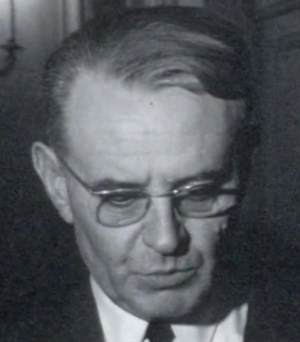Paul Huvelin
( businessman) | |
|---|---|
 | |
| Born | 22 July 1902 Chorey-les-Beaune, France |
| Died | 8 October 1995 (Age 93) Paris, France |
| Nationality | French |
| Alma mater | École Polytechnique |
French business leader. Attended Bilderberg the year before becoming leader of the National Council of French Employers (the Patronat).
| |
'Paul Huvelin was a French business leader. He was president of the National Council of French Employers (CNPF) between 1966 and 1972.
Early Life
Son of a Burgundy wine merchant, Paul Huvelin entered the École Polytechnique from which he graduated in the class of 1921[1].
After his studies, he entered private industry as an engineer. In 1928, he married Madeleine Giros, daughter of Alexandre Giros (1870-1937), of the Société Générale d'Entreprises (SGE), an influential boss in the electricity industry. Paul Huvelin joined his father-in-law's companies: he became administrator of SATAM[2], l'Énergie électrique du Nord de la France (CEO from 1940 to 1946), and of Loire-et-Centre.
After the war, Paul Huvelin became vice president of SGE, deputy CEO in 1946 and CEO from 1959 to 1970 of Kleber Colombes (the second biggest French manufacturer of tires, absorbed by Michelin in 1981), of which the Giros family is a shareholder. He was also a director, following his father-in-law, in other companies: Hotchkiss, Compagnie française Thomson-Houston, Tréfileries and Laminoirs du Havre.
Paul Huvelin was also from the early 1950s administrator of the Paris Union Bank (BUP), and vice-president in 1963. He sat on the board of the Compagnie Financière de Suez, which absorbed the BUP in 1967. He joined the board of directors of the Compagnie générale d'électicité (CGE) in 1972[3].
Paul Huvelin was a member of the European Committee for Economic and Social Progress since at least 1955. He also joined other business think tanks organized by the CNPF leaders Georges Villiers and Jacques Warnier.
Leader of the CNPF (1966-1972)
As a member of the board and vice-president of the National Council of French Employers (CNPF), he benefited from the withdrawal of Marcel Demonque, the presumed successor of Georges Villiers, and could thus become president of the organization in 1966.
At the end of the movement of May 1968, Paul Huvelin heads the employers' delegation during the negotiation of the Grenelle Agreements. “The CNPF approached this negotiation with the acute awareness of the seriousness of the situation in the country. What he essentially sought in this agreement is social peace,” he said; adding: "What I want to say is that this confrontation was hard, but really it was constructive"[4] .
He was re-elected president in July, while the elders in the organization (Villiers, Mayolle) left the management committee. He then implemented a reform of the CNPF: election of the president by a larger college, president re-eligible only once, after a 3-year term, substitution of an enlarged permanent assembly for the current management committee and that of an executive council, giving more space to regional bodies, and the appointment of 4 vice-presidents[5].
In 1972 , he left his place to François Ceyrac at the head of the CNPF[6].
In 1971 , he took over the presidency of the Confederation of European Business (UNICE), which he continued to exercise after the end of his term at the CNPF, until 1976.
Paul Huvelin died in Paris at the age of 93, in October 1995. He was married and the father of 8 children.
Event Participated in
| Event | Start | End | Location(s) | Description |
|---|---|---|---|---|
| Bilderberg/1965 | 2 April 1965 | 4 April 1965 | Italy Villa d'Este | The 14th Bilderberg meeting, held in Italy |
References
- ↑ School
- ↑ Journal
- ↑ Le Monde, 7 avril 1972, "La C.G.E. renforce sa direction générale et accueille M. Paul Huvelin à son conseil d'administration". La CGE est alors présidée par Ambroise Roux, vice-président du CNPF
- ↑ Le Monde
- ↑ Le Monde, 7 juin 1969, "La réforme du CNPF entrera en vigueur en janvier 1070", Ibid., 29 octobre 1969, "L'assemblée générale extraordinaire du C.N.P.F. adopte le projet de réforme de l'organisation patronale"
- ↑ Echos